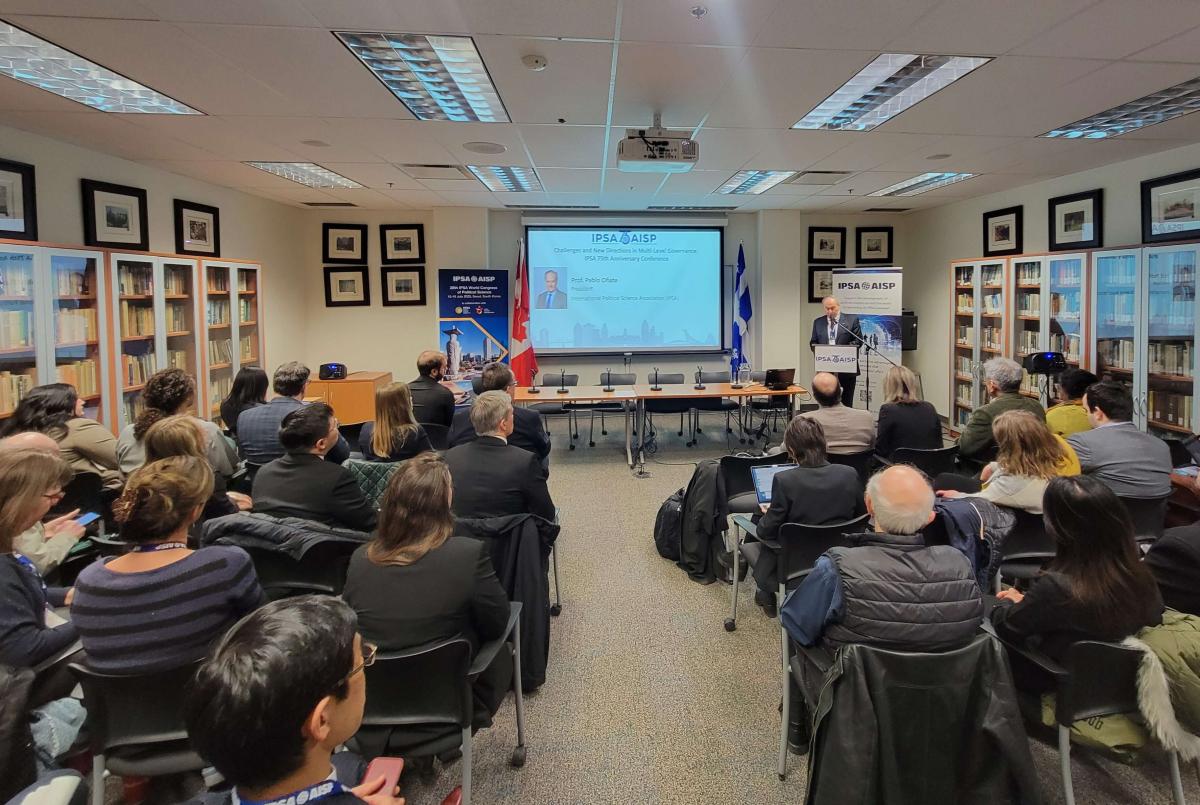

First Day at IPSA’s 75th Anniversary Conference on Challenges and New Directions in Multi-Level Governance
Publication date: Thu, 25 Apr 2024
IPSA’s 75th anniversary conference on Challenges and New Directions in Multi-Level Governance kicked off on 25 April 2024 at Concordia University, Montréal. The conference was presented in partnership with the Government of Québec, Concordia University, the Konrad Adenauer Foundation (KAS) Canada, and the Conseil des relations internationales de Montréal (CORIM), and with collaborative support from the Canadian Political Science Association (CPSA) and the Société québécoise de science politique (SQSP), Future Earth, Sustainability in the Digital Age, Forum of Federations, and Connexion internationale de Montréal (CIMtl). We extend our heartfelt appreciation to our partners and collaborators for their invaluable contributions to this international conference.
Opening Remarks
In her opening address, Kim Fontaine-Skronski, IPSA Executive Director and Master of Ceremonies, extended a warm welcome to the IPSA Executive Committee, speakers, participants, and guests. She thanked the Program Committee as well as the IPSA Secretary and staff, and thanked all the partners who helped to organize this event.
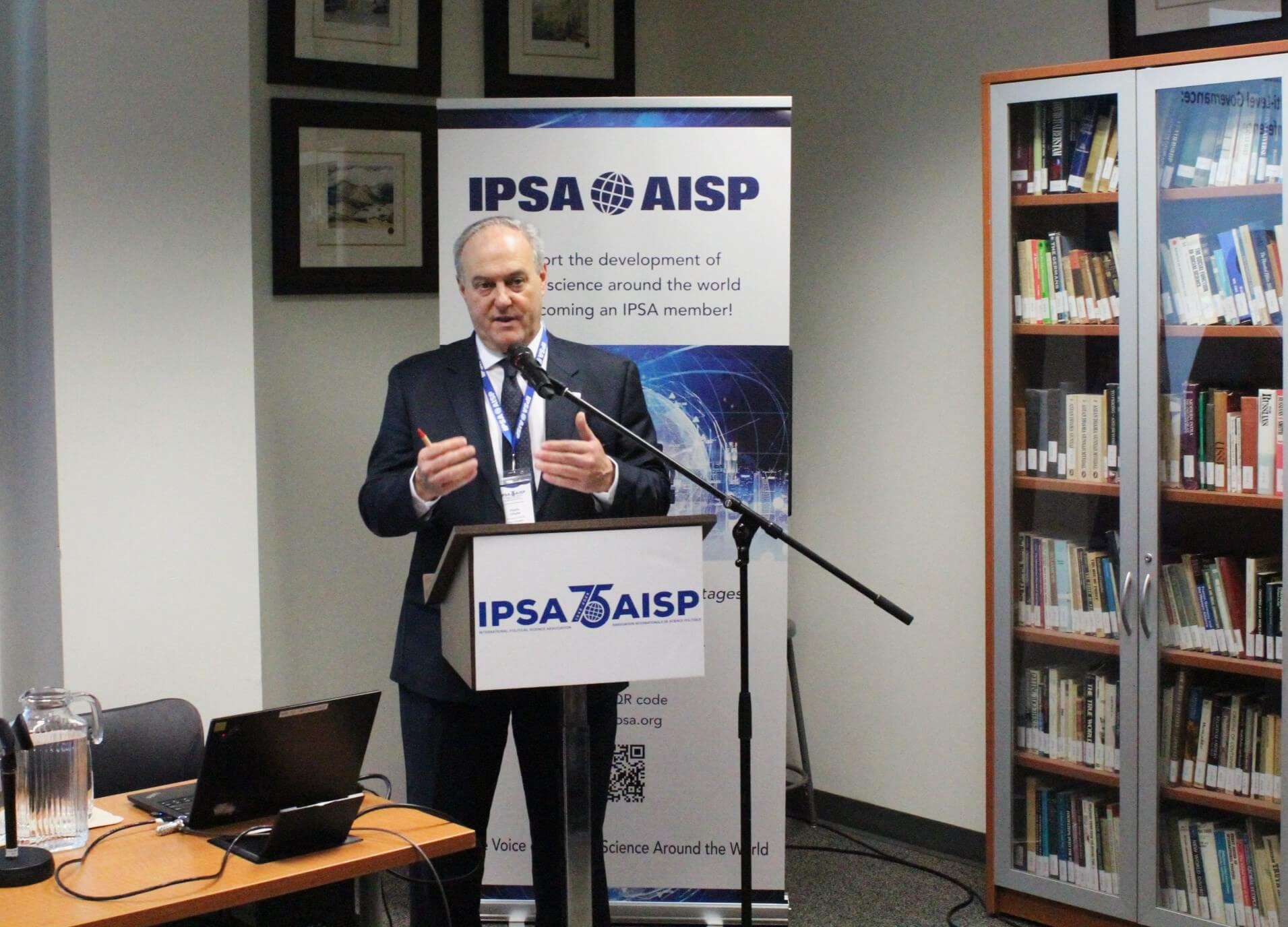 After Dr. Fontaine-Skronski’s remarks, IPSA President Pablo Oñate highlighted the organization's historic mission of promoting political science worldwide. Dr. Oñate expressed gratitude to the Program Committee and Prof. Daniel Salée, Chair of the Political Science Department at Concordia University, for their contributions to the success of the conference. Prof. Oñate also commented on the relevance of the conference theme, noting that multi-level governance has been on the rise notably since the start of the 21st century. He pointed out that the emergence of a new regionalism has led to a change in political structures and a dispersion of power from the state upwards and downwards. He noted that while the state is not disappearing, its role is certainly evolving.
After Dr. Fontaine-Skronski’s remarks, IPSA President Pablo Oñate highlighted the organization's historic mission of promoting political science worldwide. Dr. Oñate expressed gratitude to the Program Committee and Prof. Daniel Salée, Chair of the Political Science Department at Concordia University, for their contributions to the success of the conference. Prof. Oñate also commented on the relevance of the conference theme, noting that multi-level governance has been on the rise notably since the start of the 21st century. He pointed out that the emergence of a new regionalism has led to a change in political structures and a dispersion of power from the state upwards and downwards. He noted that while the state is not disappearing, its role is certainly evolving.
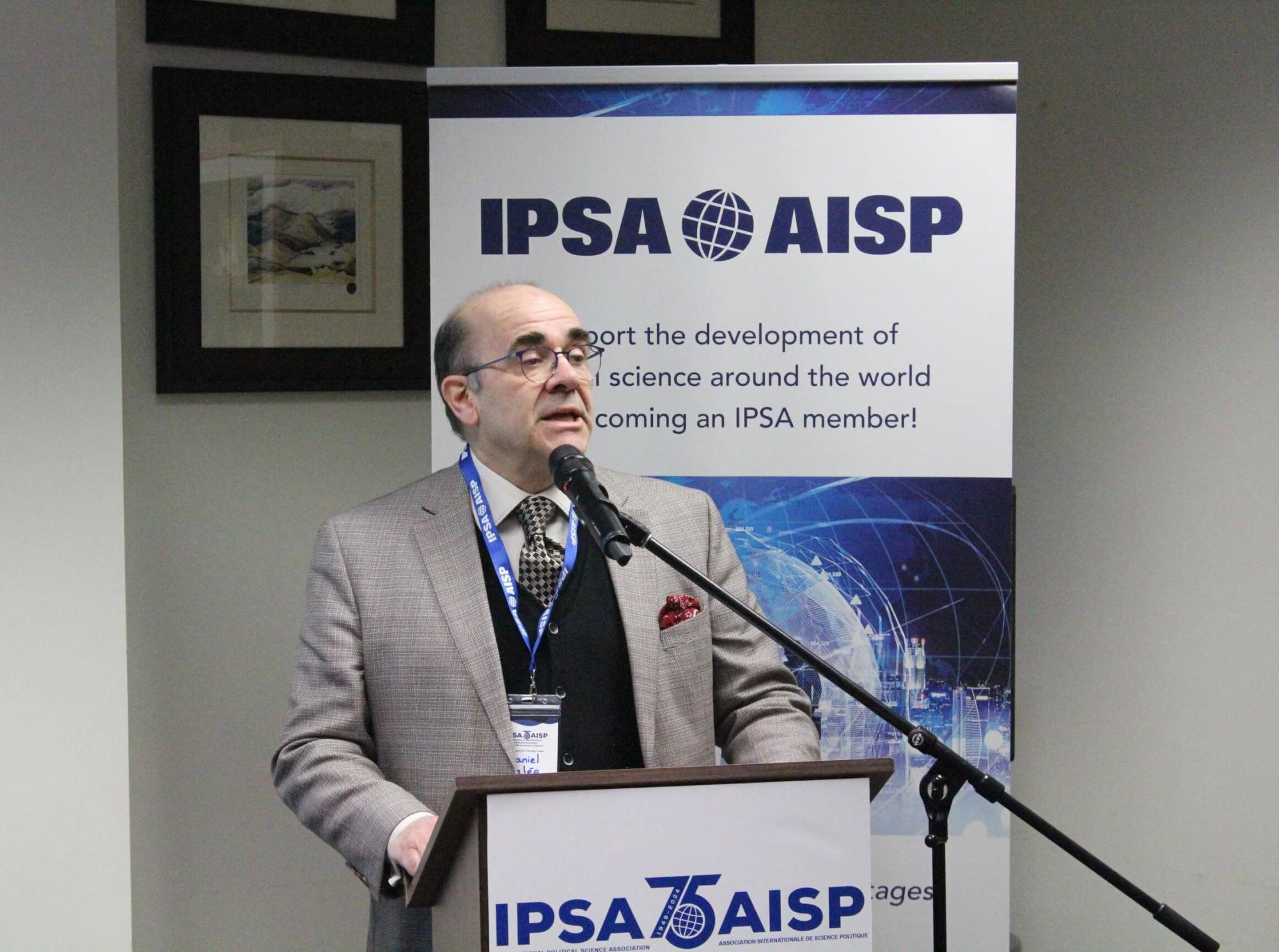 Daniel Salée began his address by paying tribute to the unceded indigenous territories upon which Concordia University was established. Prof. Salée then highlighted the long-standing collaboration between the university and IPSA, which has spanned over 18 years. He concluded by expressing his best wishes for a successful conference and fruitful discussions on multi-level governance.
Daniel Salée began his address by paying tribute to the unceded indigenous territories upon which Concordia University was established. Prof. Salée then highlighted the long-standing collaboration between the university and IPSA, which has spanned over 18 years. He concluded by expressing his best wishes for a successful conference and fruitful discussions on multi-level governance.
Panels
Following the opening remarks, the first morning session featured a series of engaging panels on a diverse range of topics related to multi-level governance. These included the role of the European Union in the global arena, federalism, indigenous governance, climate policy, and conflict.
After a brief intermission, the discussions resumed exploring pressing contemporary issues such as multi-level governance challenges faced by the European Union, global perspectives on federalism, identity politics, environmental sustainability, and governance in conflict zones.
The afternoon sessions focused on global governance challenges. These included discussions examining trust, democracy, and legitimacy within the EU; the impact of federalism on policy; multi-level governance in diplomacy and citizens’ participation; comparative governance perspectives; and evolving security landscapes.
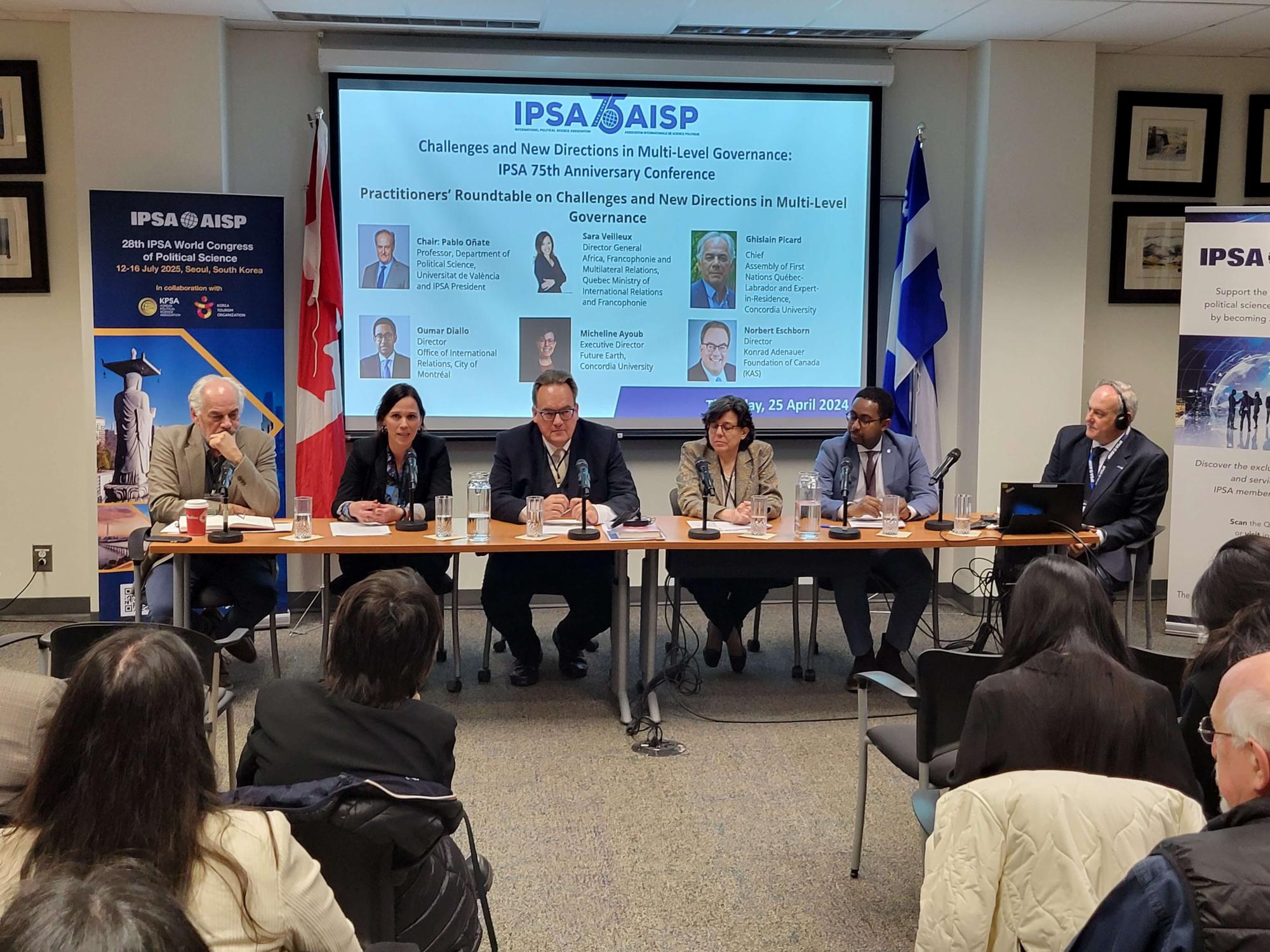 Practitioners’ Roundtable on Challenges and New Directions in Multi-Level Governance
Practitioners’ Roundtable on Challenges and New Directions in Multi-Level Governance
The highlight of the day was the Practitioners’ Roundtable on Challenges and New Directions in Multi-Level Governance, chaired by IPSA President Pablo Oñate. This roundtable brought together prominent practitioners from different institutions to share their extensive experience in the field of multi-level governance. Sara Veilleux, Director General, Africa, Francophonie and Multilateral Relations, Québec Ministry of International Relations and La Francophonie; Oumar Diallo, Director, Office of International Relations, City of Montréal; Ghislain Picard, Chief of the Assembly of First Nations Québec-Labrador and Expert-in-Residence, Concordia University; Micheline Ayoub, Executive Director, Future Earth; and Norbert Eschborn, Director, Konrad Adenauer Foundation (KAS) Canada, reflected on the complexities of multi-level governance and discussed innovative strategies to address its inherent challenges.
The 75th Anniversary Ceremony and Reception
The first day concluded with a ceremony marking IPSA’s 75th anniversary attended by many special guests, including representatives from the Québec Ministry of International Relations and La Francophonie, the City of Montréal, the Konrad Adenauer Foundation of Canada, as well as IPSA Executive Committee members and conference participants.
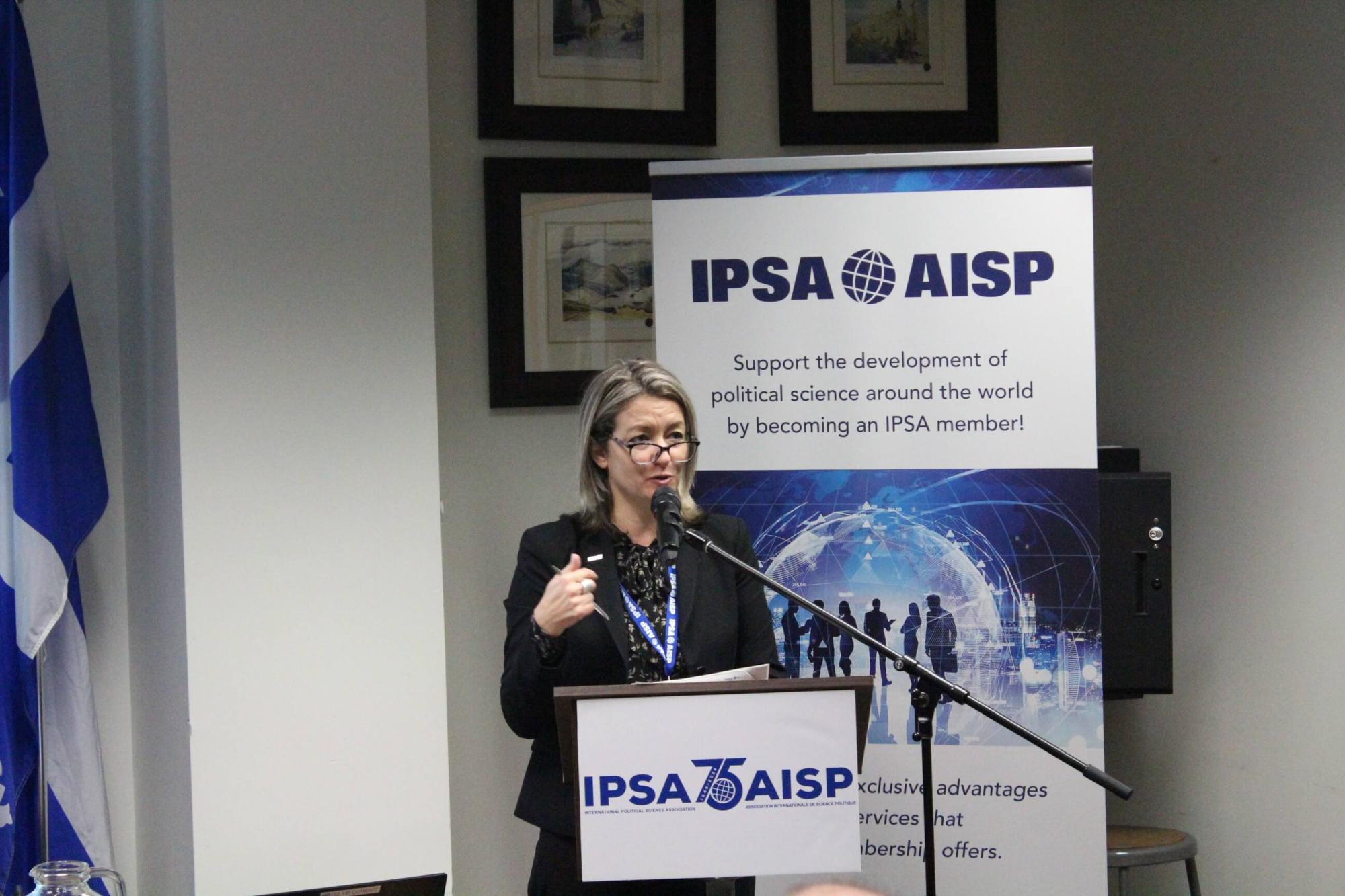 Kim Fontaine-Skronski - IPSA Executive Director
Kim Fontaine-Skronski - IPSA Executive Director
IPSA’s 75th anniversary ceremony began with an address by IPSA Executive Director Kim Fontaine-Skronski, who welcomed guests and thanked the conference partners and collaborators for their support. Dr. Fontaine-Skronski took the opportunity to announce the launch of the IPSA Timeline, a digital chronicle on the association's website, showcasing the milestones that have shaped IPSA over the past 75 years. Discover the IPSA Timeline now!
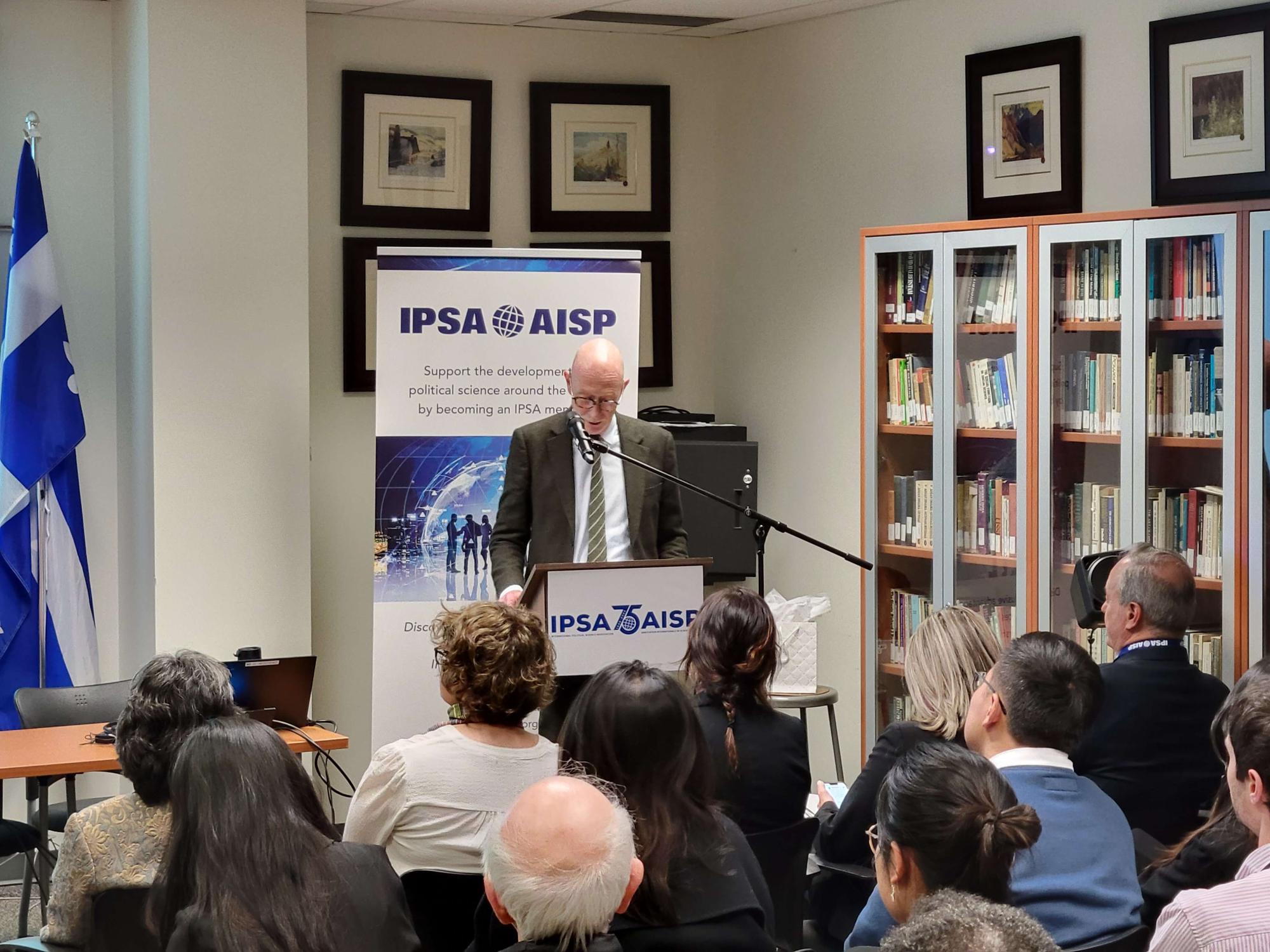 Graham Carr - President and Vice-Chancellor of Concordia University
Graham Carr - President and Vice-Chancellor of Concordia University
In his address, Graham Carr, President and Vice-Chancellor of Concordia University, welcomed conference participants to Concordia and congratulated IPSA on its 75th anniversary. Prof. Carr highlighted the collaborative efforts between IPSA and Concordia, emphasizing their shared priorities of supporting colleagues in emerging democracies and facilitating open exchanges of ideas. Prof. Carr also commended IPSA's global network and Concordia's pivotal role in its growth, citing joint initiatives such as the IPSA-Concordia Summer Institute in Applied Diplomacy. Prof. Carr concluded by highlighting Concordia's achievements in political science and the significance of IPSA's work in addressing pressing global challenges.
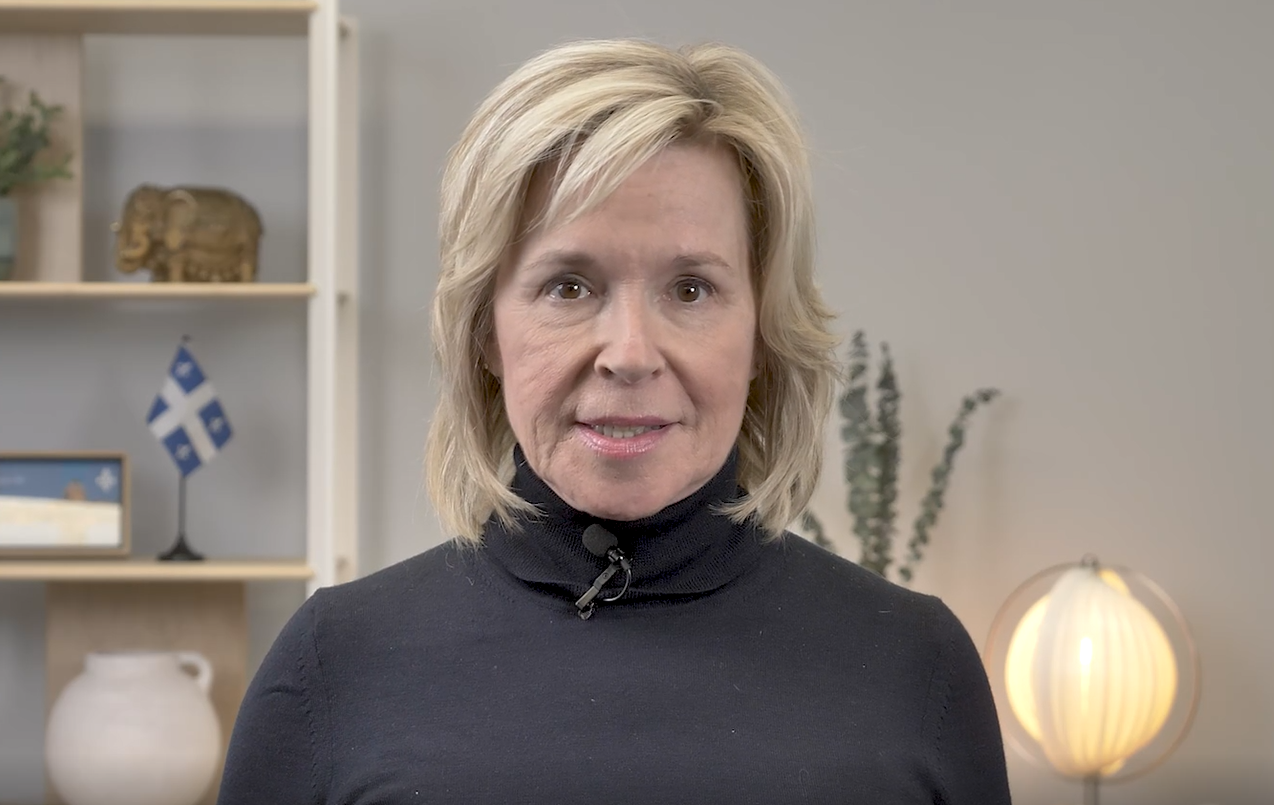 Martine Biron - Québec Minister of International Relations and La Francophonie
Martine Biron - Québec Minister of International Relations and La Francophonie
Martine Biron, Québec Minister of International Relations and La Francophonie, delivered a video message acknowledging IPSA's pivotal role in shaping political science since its foundation in 1949 and emphasizing IPSA's prominent place among the 80 international associations based in Montréal. The minister also reaffirmed the Government of Québec’s commitment to supporting IPSA and promoting mutual values.
Alia Hassan-Cournol - City of Montréal Councillor
In her video address, Alia Hassan-Cournol, representing the Mayor of Montréal and the city administration, congratulated IPSA on its 75th anniversary. She also discussed the administration's ongoing efforts to combine theory and practice to develop public policies that create a more inclusive society.
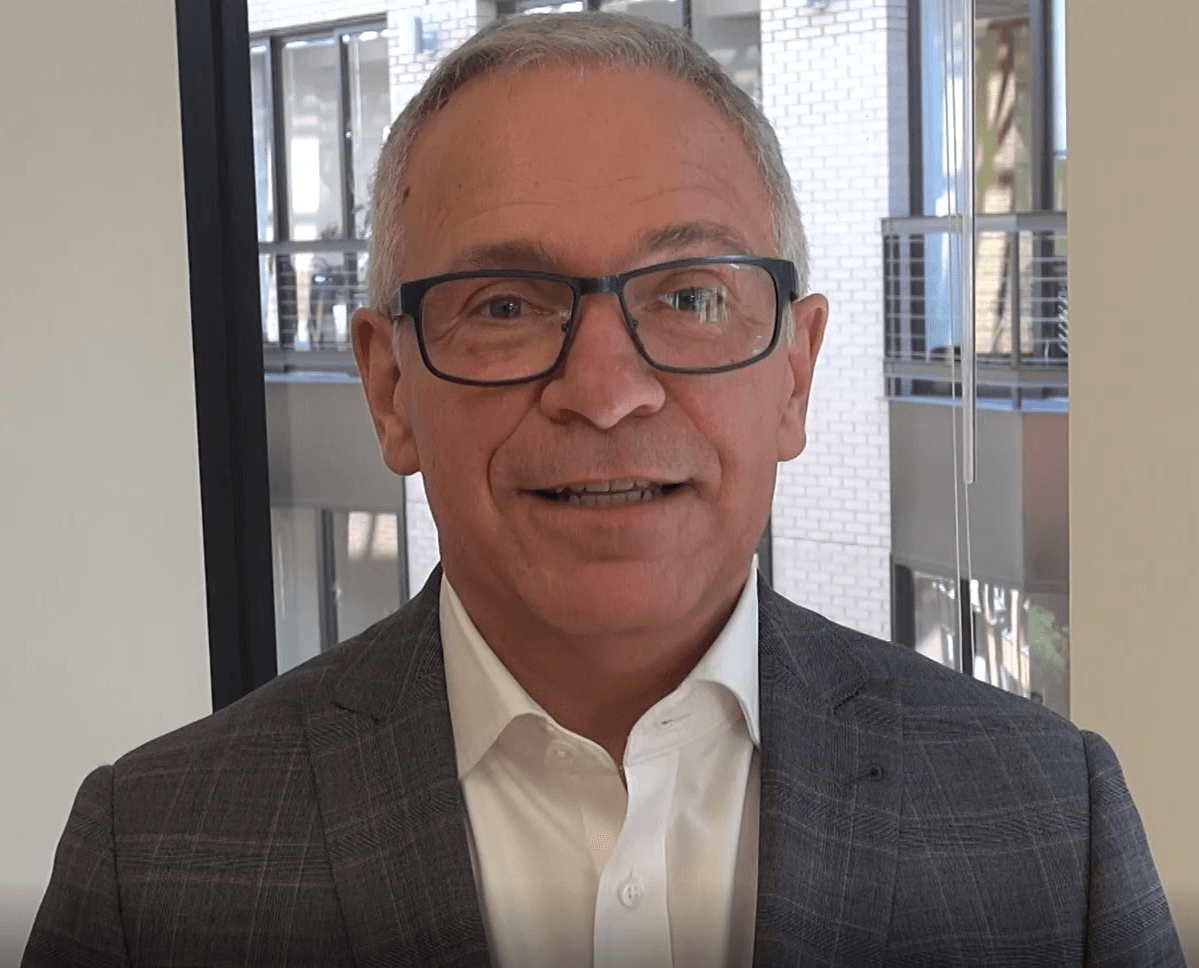 Stéphane Paquet - President and CEO of Montréal International
Stéphane Paquet - President and CEO of Montréal International
In his video message, Stéphane Paquet, President and CEO of Montréal International, extended warm congratulations to IPSA on its 75th anniversary and the conference. Mr. Paquet highlighted IPSA's role as the global voice of the political science community, emphasizing its efforts to bring together diverse perspectives from around the world to advance the field of political science. He further noted that the IPSA Secretariat has been headquartered in Montréal for nearly two decades and that its collaboration with Concordia University, Montréal International, and other international organizations contributes to Montréal's status as the Canadian capital of international organizations.
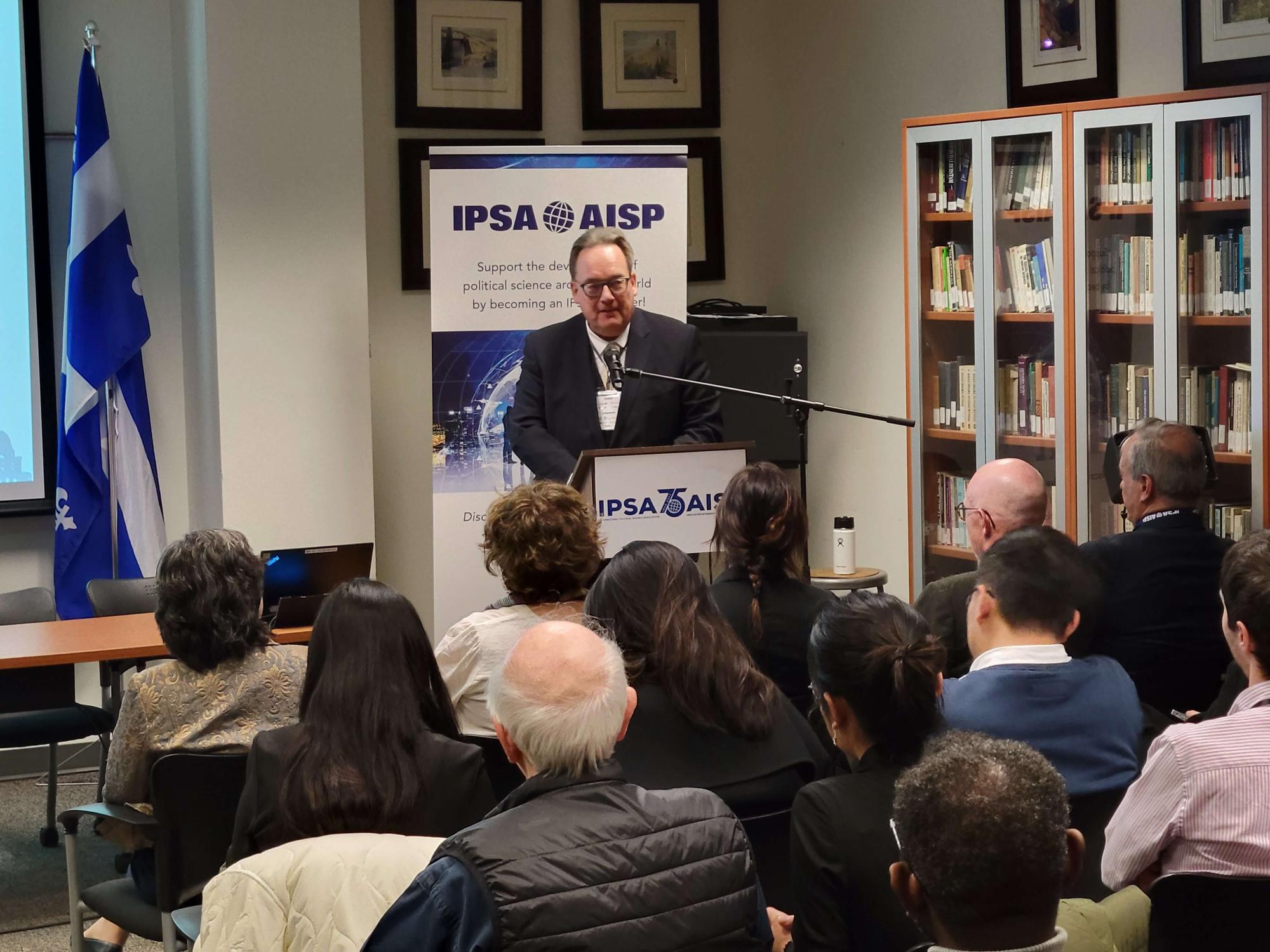 Norbert Eschborn - Director, Konrad Adenauer Foundation (KAS) Canada
Norbert Eschborn - Director, Konrad Adenauer Foundation (KAS) Canada
Norbert Eschborn, Director of the Konrad Adenauer Foundation (KAS) Canada, reflected on the themes of the conference and the enduring partnership between IPSA and KAS in the promotion of political science. He highlighted the important role played by IPSA Executive Director Kim Fontaine-Skronski in fostering a fruitful partnership between the two organizations since 2019 and acknowledged the contributions of women in advancing IPSA’s mission.
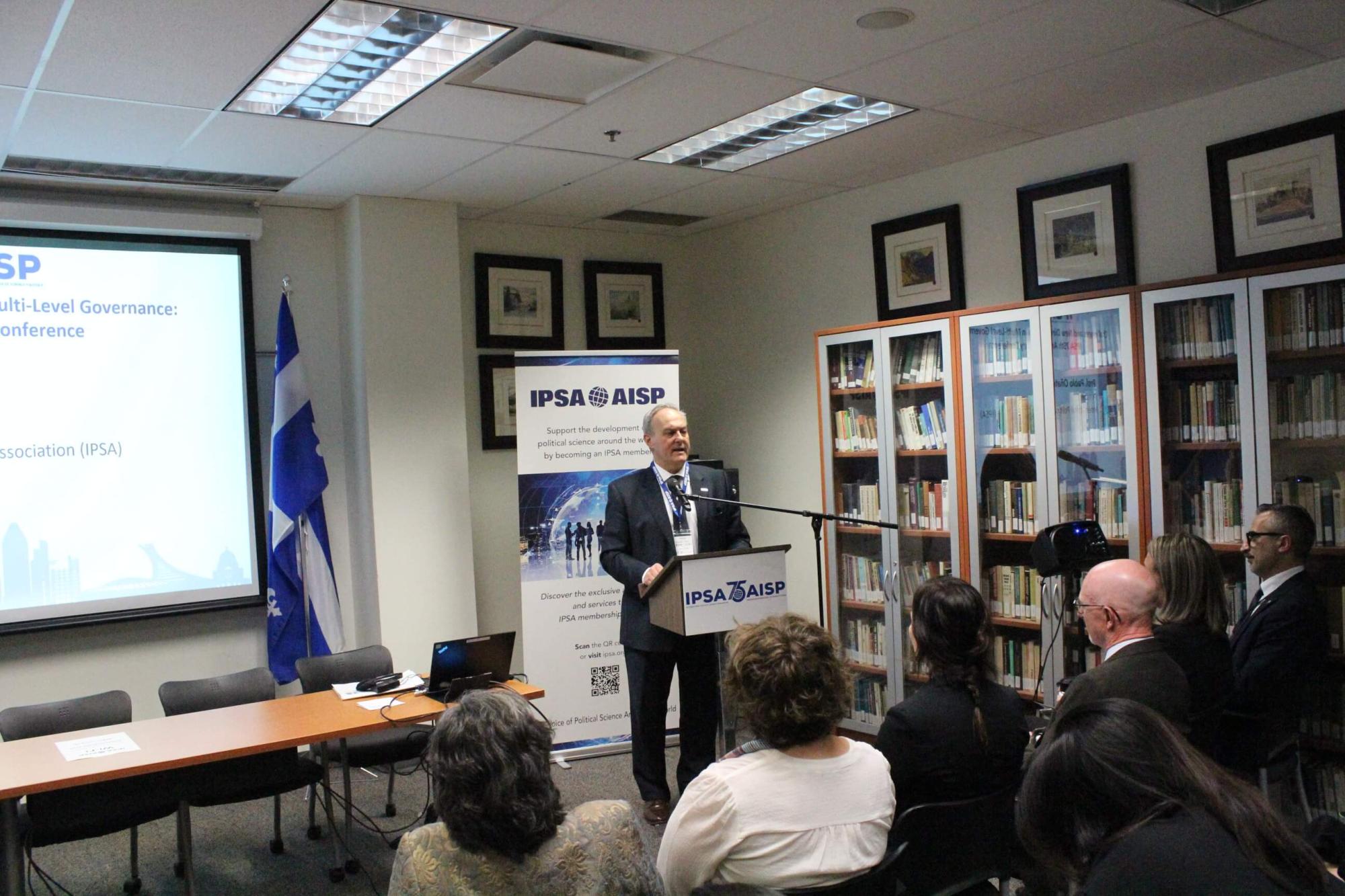 Pablo Oñate - IPSA President
Pablo Oñate - IPSA President
IPSA President Pablo Oñate thanked the Program Committee, conference partners, and collaborators for their contributions and reiterated the importance of multi-level governance in addressing contemporary global challenges. President Oñate also took the time to reflect on IPSA’s long journey since its foundation in 1949 and its first World Congress in 1950 in Zurich. He discussed the evolution of the Association, most notably reflected in its increased gender inclusivity. He concluded by expressing his profound gratitude to IPSA’s global community and to all those who contributed to IPSA’s success.
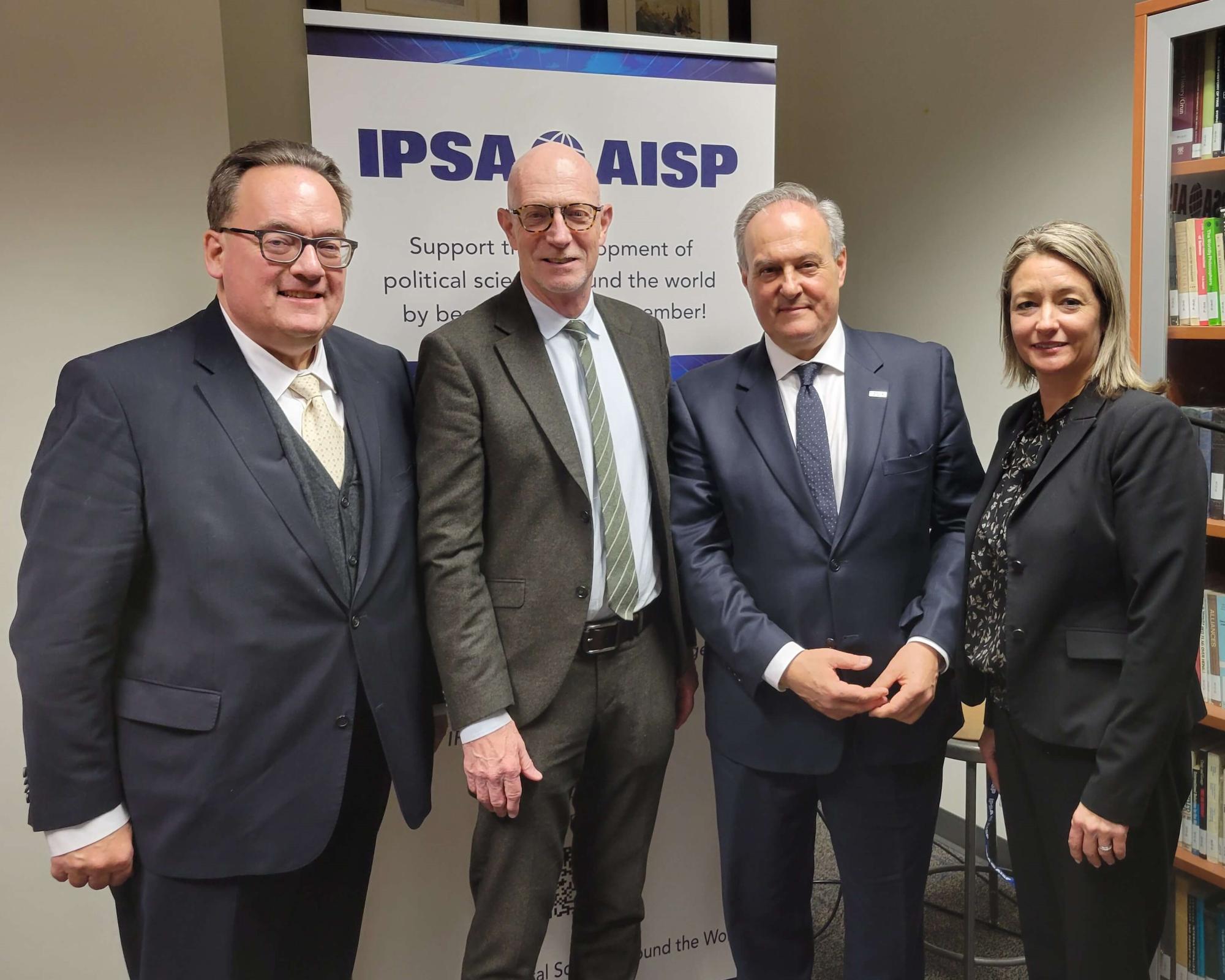
Photo (left to right): Norbert Eschborn (Director, Konrad Adenauer Foundation Canada), Graham Carr (President and Vice-Chancellor of Concordia University), Pablo Oñate (IPSA President) and Kim Fontaine-Skronski (IPSA Executive Director).











